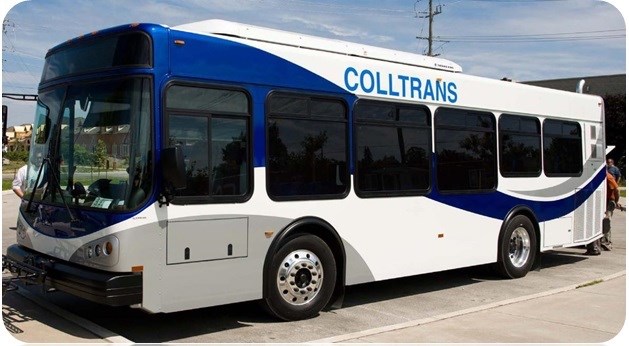The future of Collingwood transit could be electric.
The Transit Service Review and Optimization Study got the final stamp of approval by council on Monday night, which included approving a move to on-demand transit starting in the summer of 2022, as well as a phased fare hike.
As part of the approval, staff will also be assessing the feasibility of adding battery electric buses to the Colltrans fleet, which raised some concerns from councillors about future costs.
“I’m trying to think about budgets to come, and how we’re going to pay for this stuff,” said Coun. Mariane McLeod.
As part of the study, which was completed by IBI Group, the consultant provided preliminary cost considerations should the town choose to move to battery electric buses.
Currently, the Town of Collingwood is working with Metrolinx in a joint procurement project as part of the Metrolinx Transit Procurement Initiative, which would help mitigate some of the costs.
According to Monday’s staff report, the purchase of battery electric buses is not likely to affect the town budget until 2023/24 when a feasibility study in co-operation with Metrolinx has been completed.
The cost of a battery electric bus is approximately $1 million, compared to $600,000 for a diesel bus. Battery electric buses also require in-service recharging systems at a cost of $500,000 each and $125,000 for each two-bus overnight plug-in charging system. Hydro substations are required at the site of the recharging system, which would need to be procured.
Director of public works, engineering and environmental services Peggy Slama confirmed that there is a significant capital cost that would go into the transition to battery electric buses.
“Our partnership with (Metrolinx) is where we’re going to be able to leverage some expertise. Also, greater volume of purchases will help us,” said Slama, adding there are indications there will be funding sources available through federal and provincial levels of government to help cover costs of electrification.
“I see some very serious prioritization having to take place in future budgets,” said McLeod.
In the short term, the town will be adopting an on-demand service strategy as of July 1, 2022 to coincide with a new operating contract, and combine the conventional and specialized transit services into the same contract.
On-demand service will mean riders would book rides online in advance and buses would only be deployed for requested rides. The option to re-introduce regular routes into the service at a future date is still on the table under the on-demand system, should staff find certain routes are regularly full.
A switch to on-demand will also mean previously un-serviced areas in Collingwood’s south end will now be eligible to receive transit.
SEE MORE: On-demand transit could motor into Collingwood in August
The consultant also made recommendations for long-term transit planning that were also approved by council, which include a fare increase to begin in April 2022. Specifically, individual rides will increase from $2 to $2.50 and monthly passes from $40 to $50 by April 2022. They will be increased further to $3 for individual rides and $60 for a monthly pass within five years.
A regional transit service between Collingwood, Blue Mountains, Wasaga Beach, Clearview and Stayner will also be explored. The study specifically suggests adding service between Nottawa and Collingwood, and Stayner and Collingwood.
Council voted unanimously in favour of approving on-demand transit service, as well as most of the recommendations out of the consultant report regarding a five-year transit plan, which will include consideration in the 2023 budget for a new staff member dedicated to transit.
Coun. Tina Comi and Coun. Bob Madigan were absent from the meeting.
For more information on the transit study, click here.
